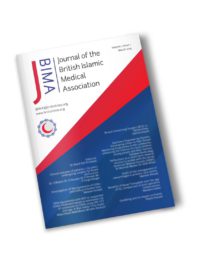
I recall sitting down to write the previous JBIMA Editorial and thinking that the only appropriate topic to cover was the suffering of our brothers and sisters in Gaza as the world looks on. It pains me that another 4 months later, Israeli bombardment continues and a ceasefire is yet to be implemented.
As healthcare professionals, we aim to save lives, to improve their quality and to heal the pain of our fellow human beings. The scenes in Gaza are particularly difficult for us to comprehend; they go against our very profession and stand in opposition to our values. We agree to the terms of the Hippocratic Oath when we start as students to not harm any patient under our care, so what is stopping doctors in Israel from speaking out? As of the time of writing, since October, more than 35,000 Palestinians have been killed, which roughly equates to 180 a day, 1 is killed every 8 minutes. When we consider it from this perspective, the sheer horror becomes clear. No family in Gaza has escaped unscathed as a parent, sibling, spouse, or child from almost every household has been killed or seriously injured.
Sometimes numbers fail us. As human beings, we can quickly become overwhelmed by abstract numbers and those who have been killed end up becoming faceless statistics. It is in this vein that we must remember Dr Ahmad Al-Maqadmeh and his mother Dr Yusra Al- Maqadmeh who were executed by Israeli forces after their withdrawal from Al-Shifa hospital. This was a young Plastic Surgeon and GP who were murdered for carrying out their jobs. Even the Royal College of Surgeons paid tribute to him, though the statement was sadly quite weak. The attacks on healthcare professionals and hospitals equates to war crimes that Israel must be held accountable for.
Speaking of Al-Shifa hospital, the building is destroyed. It is barely recognisable to the busy, bustling hospital it was only a few months ago. Al-Shifa hospital is now no longer fit to even be a graveyard; it is a ghost town and the few patients there face almost certain death. The scenes in the hospital are akin to an apocalypse film where the end of the world has arrived. In Gaza, the healthcare system has for all intents and purposes, collapsed. Its people are even more desperate for medical aid, but even that is proving difficult to allow in.
The most needed solution to the medical crisis in Gaza is the implementation of an immediate ceasefire. Israel has to stop its attacks on the strip. And thinking in the medium and long term, there needs to be a serious effort to rebuild the shattered healthcare system.
It is worth mentioning that BIMA has recently surveyed Muslim doctors across the UK about their thoughts on how their workplaces have supported them during the Gaza crisis. The responses, published in the BMJ, are deeply upsetting though unsurprising. Almost all the respondents (97%) said that the situation over the past few months has negatively impacted their wellbeing and has made their work even more challenging. Colleagues surveyed also reported a culture of silence at the workplace which has led to perceptions of double standards as hospitals say nothing on Gaza whilst statements of support were made to Ukraine. And even those who turn to social media for support are left looking over their shoulders, constantly worried about how their support for the people of Gaza will be misconstrued into something more sinister.
The BMJ covering this is a step in the right direction, but it’s too late; Muslim doctors have been struggling internally with this for months and have received very little support at their workplace. We at BIMA stand alongside our brothers and sisters who offer their support to the people of Gaza.
Wassalam.
Prof. Sharif Kaf Al-Ghazal JBIMA, Editor in Chief

